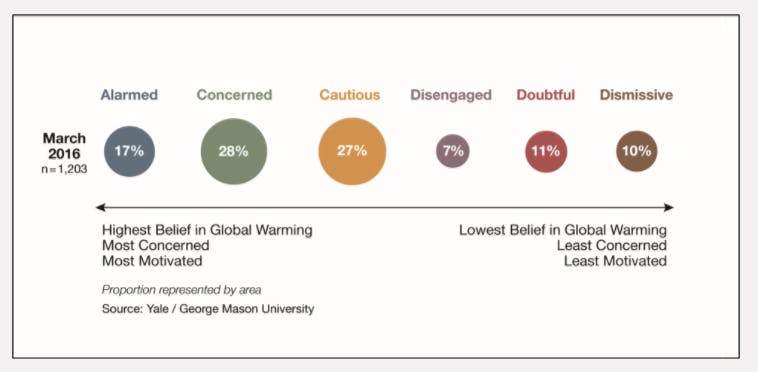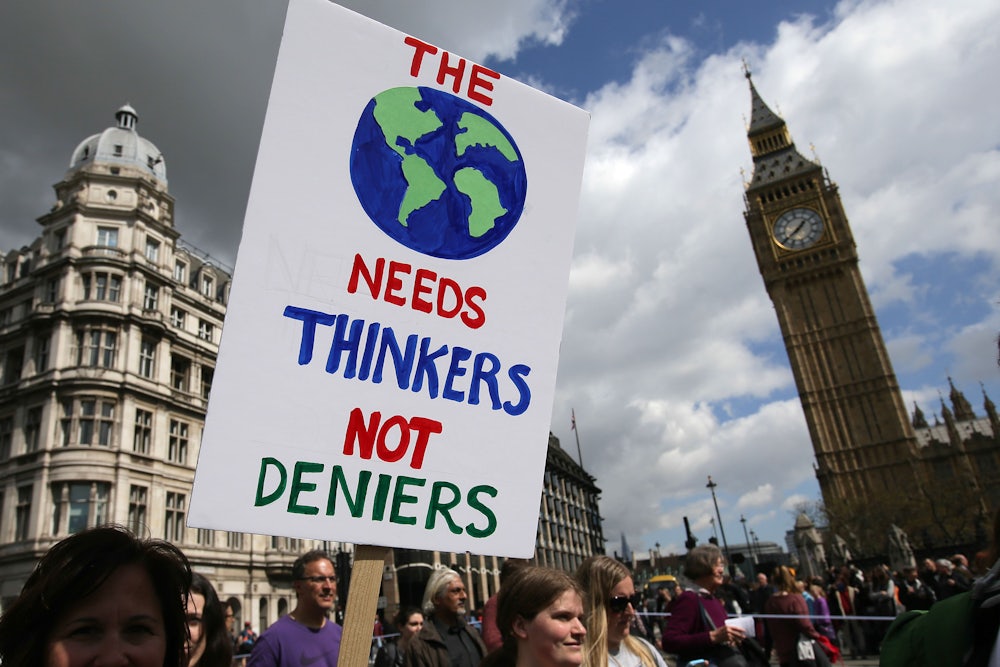NPR’s Rachel Martin had a fascinating interview on Tuesday with Katharine Hayhoe, a renowned climate scientist and evangelical Christian, in which they discussed the toxic nature of the world “climate denier”—a word that environmental reporters, including me, use all the time to describe people who don’t accept the scientific consensus that climate change is real, man-made, and dangerous. Hayhoe argued that calling people deniers is “a good way to end the conversation,” and that it’s actually more accurate to use the word “climate dismissive.”
“I think that’s the perfect term,” Hayhoe said, “because a dismissive person will dismiss any evidence, any arguments with which they’re presented, because dismissing the reality of climate change and the necessity for action is such a core part of their identity that it’s like asking them to almost cut off an arm. That’s how profound the change would be for them to change their minds about climate change.”
Hayhoe’s terminology comes from the Yale Program on Climate Change Communication, which last year published a report on how Americans view the threat of global warming. It concluded that America was divided into six categories: alarmed, concerned, cautious, disengaged, doubtful, and dismissive, the latter being people “who do not believe global warming is real and are likely to believe in various conspiracy theories about the issue.”

I’ve struggled with whether to use the word “denier,” especially because of the common accusation that it’s meant to invoke Holocaust deniers. That’s not accurate, as Peter Dykstra explained at Scientific American: The word refers to a type of psychological defense mechanism first conceived by Sigmund and Anna Freud, where “an unpleasant reality is ignored, and a realistic interpretation of potentially threatening events is replaced by a benign but inaccurate one.” That’s why I think “denier” is the most accurate term for people who ignore, misrepresent, or generally discredit the field of climate science—whether it’s because they don’t like the proposed solutions, or because they just can’t accept reality.
But another compelling reason to use “denier” is that the alternative terminology is inadequate. I won’t use the word “skeptic” because it distorts the meaning of skepticism within science. Climate scientists are skeptical by profession, and yet, a vast majority of them concluded that global warming is real and caused by humans. In other words, “skeptics” implies that the majority of climate scientists are not skeptics, when they are. The Associated Press stylebook recommends that reporters use “doubter.” That word troubles me, too, since “doubt” implies a sincerity of belief regarding the science, but many deniers are motivated instead by political ideology. When Senator Jim Inhofe brought a snowball to the Senate floor to try and prove global warming was a hoax, for instance, he was not expressing sincere “doubt” about climate science. He was just denying it.
Hayhoe argues that “dismissive” is more accurate than “denier” because she believes most people aren’t malicious about their belief systems. “The biggest thing I’ve learned in the last 10 or 15 years is that people who don’t agree with me on the science are usually fairly smart people who usually have good reasons,” she said. “Those reasons usually don’t have much to do with science,” she said, but added that “mutual respect is the foundation of further conversation.” But the goal of such a conversation is to convince climate “dismissives” to come over to the correct side of science, and even Hayhoe admits that’s unlikely:
If someone's a dismissive, tho, then all the facts in the world won't change their mind. why? bc it's their identity https://t.co/eb8X3iNeSm
— Katharine Hayhoe (@KHayhoe) February 28, 2017
But Hayhoe argues that agreeing on solutions to climate change—like reducing carbon dioxide emissions and investing in renewable energy—doesn’t require that everyone be motivated by despair over climate change. “We can often move forward on agreement on solutions even if we don’t agree on the science,” she said. I’m not sure that’s true. If someone like Republican Congresswoman Marsha Blackburn doesn’t believe that carbon dioxide is a pollutant that traps heat in the atmosphere, then why would she support efforts to reduce carbon dioxide emissions? And calling Blackburn a “dismissive” rather than a “denier” isn’t likely to make her any more amenable to such efforts.
Political compromise is highly revered, if rarely achieved, in Washington. To compromise over the science of climate change, though, is to concede certain lies told by deniers. Hayhoe is right to push for more civil dialogue, and if Republicans want to increase investment in renewable energy, the Democrats surely would work with them. But the science of climate change has been settled for years, so you can hardly blame the scientific establishment and environmental advocates for feeling a little dismissive themselves—of those who insist on debating scientific truths.
